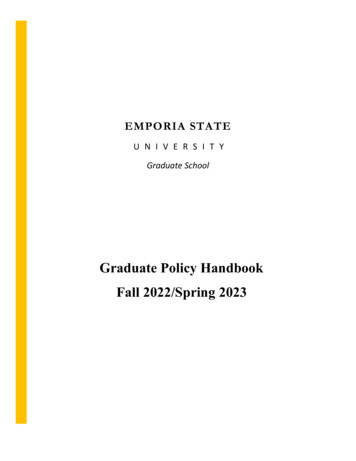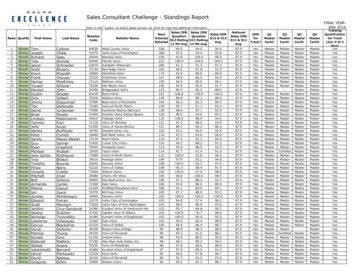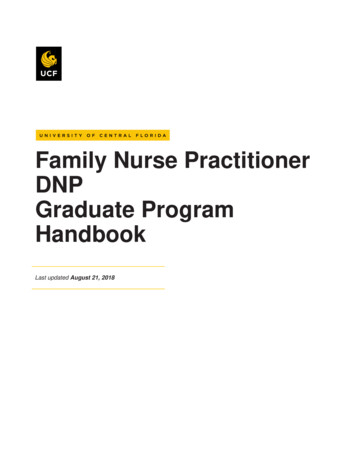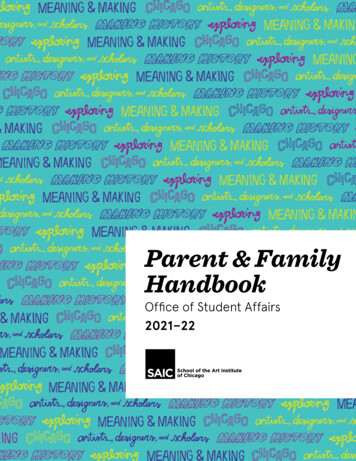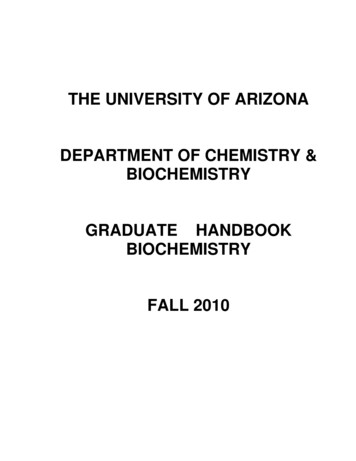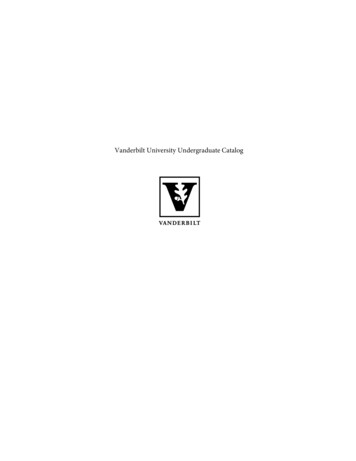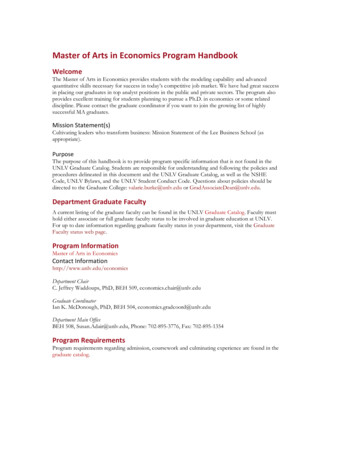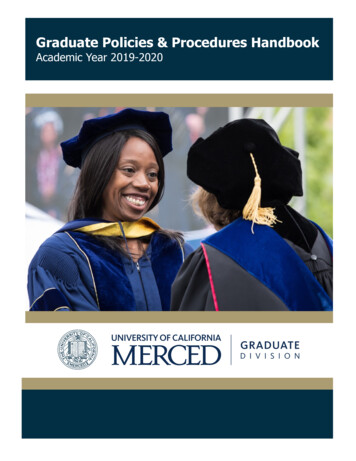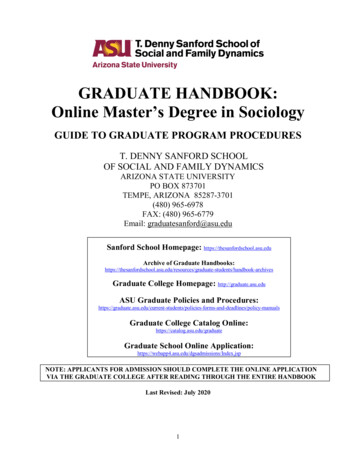
Transcription
GRADUATE HANDBOOK:Online Master’s Degree in SociologyGUIDE TO GRADUATE PROGRAM PROCEDUREST. DENNY SANFORD SCHOOLOF SOCIAL AND FAMILY DYNAMICSARIZONA STATE UNIVERSITYPO BOX 873701TEMPE, ARIZONA 85287-3701(480) 965-6978FAX: (480) 965-6779Email: graduatesanford@asu.eduSanford School Homepage: https://thesanfordschool.asu.eduArchive of Graduate es/graduate-students/handbook-archivesGraduate College Homepage: http://graduate.asu.eduASU Graduate Policies and uate College Catalog Online:https://catalog.asu.edu/graduateGraduate School Online Index.jspNOTE: APPLICANTS FOR ADMISSION SHOULD COMPLETE THE ONLINE APPLICATIONVIA THE GRADUATE COLLEGE AFTER READING THROUGH THE ENTIRE HANDBOOKLast Revised: July 20201
TABLE OF CONTENTSINTRODUCTION .3ADMISSIONS INFORMATION .4A. Admission Requirements. 4B. Application Requirements . 4C. Processing of Applications . 4D. Concurrent Degrees . 4E. Preadmission Credit . 5F. Transfer Credit . 5G. Admission and Denial Criteria. 5H. Tuition and Residency Requirements. 6I. Faculty . 6PROGRAM REQUIREMENTS .6A. Course Requirements . 6B. Capstone and Culminating Experience Courses . 7C. Specialization in Life Course and Aging . 7D. Plan of Study (iPOS) . 8E. Advising . 8EXPECTATIONS, POLICIES, AND PROCEDURES .8A. Enrollment and Tuition. 8B. Timelines . 9C. Maintaining Satisfactory Academic Progress . 9D. Academic (Grade) Grievance . 11E. Professional Conduct . 12STUDENT RESOURCES .14A. Academic and Professional Development Resources . 14B. Graduate and Professional Student Association . 14C. Student Business Services . 14D. Student ID Cards, SunCard Services . 14E. Health Services . 14F. Counseling Services. 14G. Disability Accommodations . 14H. Veterans Services . 15I. IT Help Desk . 15J. International Students and Scholars Center (ISSC) . 15GRADUATION .15A. iPOS Completion . 15B. Applying to Graduate. 15C. Graduation Ceremonies . 15D. Attire (Cap and Gown). 16E. Receiving Your Diploma. 16APPENDIX A: Sample Plan of Coursework for Student Beginning Program Fall A .172
Sociology: Online Master of Arts (MA)Forging New Expertise in a Complex WorldINTRODUCTIONThe MA in Sociology is a non-thesis degree program that focuses on the practical application of research.It does not require a GRE for admission and can be completed in as little as 15-18 months, enablingstudents to enter the job market sooner. Students in this program learn how social context affects thewell-being of individuals and families and study the factors that influence successful relationships andoutcomes. Graduates often pursue careers working with children, youth, and adults in human, social, andgovernment agencies.This 30 credit-hour terminal master's degree prepares students to help individuals and families succeedin their relationships and achieve positive outcomes working and living within their communities. Anapplied practitioner-oriented approach teaches students to evaluate and consume research and translateresearch into best practices. Courses are taught by experienced faculty who are trained in the area andhave considerable expertise in delivering high-quality online education.This Graduate Handbook supplements the Graduate Catalog and the Graduate College Policiesand Procedures s-forms-and-deadlines/policy-manuals)distributed by the ASU Graduate College. Graduate students should be familiar with and observeall requirements and procedures as defined in those publications.3
ADMISSIONS INFORMATIONAdmission to the Online MA in Sociology requires the submission of all application materials cited inthe Graduate nfo/ASU00/LASOCMA/graduate/false/searchOnline)and the program in Sociology. At a minimum, applicants are expected to meet GPA requirementsestablished by the Graduate College. Questions regarding admissions procedures should be directedto the Graduate Coordinator at graduatesanford@asu.edu.A. Admission RequirementsApplicants must have a baccalaureate degree from an institution with regional accreditation; in mostcases, an undergraduate cumulative GPA of 3.0; evidence of good fit with the program; a strongpersonal statement, including quality writing; and positive letters of recommendation.B. Application RequirementsThe Sanford School application process is completed online through ASU Graduate ndex.jsp). In addition to the application form and materialsrequired by the Graduate College, including official transcripts and official TOEFL test results forinternational applicants (please see nglishproficiency), the following information must be submitted for the supplemental application to theMaster’s program in Sociology. All materials must be submitted online via the Graduate College bythe deadlines posted on the program website.Requirements for the Supplemental Application to the master’s program in Sociology:a. Two letters of recommendation. These letters should be from people who know you as astudent or in a professional capacity. Letters from family members or friends do not meet thiscriterion.b. A resume that summarizes the academic and employment experiences of the applicant, as wellas applicable community involvement.c. A 4-5 page, double-spaced personal statement addressing the following: State your professional goals, interests, and reasons for desiring to enroll in this program, Describe your strengths that will help you succeed in the program and in reaching yourprofessional goals, Describe the significant responsibilities you have held, Include any additional information that you feel will help the committee evaluate yourapplication.C. Processing of ApplicationsCredentials submitted by the applicant are evaluated by the Graduate College and by the OnlineGraduate Committee.D. Concurrent DegreesA student may pursue concurrent masters/doctoral degrees provided the degree programs are indifferent areas with prior written approval from the head of the academic unit for each degreeprogram and the Graduate College. A separate online application is required for each degree program.4
Students cannot pursue both Sociology and Family and Human Development Master’s degrees fromASU.E. Preadmission CreditA Master's degree from ASU requires, at a minimum, 30 credit hours of approved graduate-levelcoursework. Credit hours used towards a previous degree cannot count towards these 30 credit hours.With approval of the Sanford School and the Graduate College, students may complete select courseswithin the online master’s degree in Sociology prior to admission to the program. Should a studentbe admitted to the program within three years of completing this coursework, a maximum of 12 ofthese hours may be counted towards the master’s program given the student earned grades of “B” orbetter in the courses and they were not used towards a previous degree. Please see the ASU GraduatePolicies and Procedures s-forms-anddeadlines/policy-manuals) for further information regarding Academic Requirements and PreAdmission Credit.F. Transfer CreditTransfer credits, either from within ASU or from another institution, are not accepted. SOC 500 andSOC 501 may be replaced by equivalent graduate courses in the program (with FAS, CDE, or SOCprefixes) with approval by the program director/academic advisor.G. Admission and Denial CriteriaThe Online Graduate Committee will review completed applications and make recommendations foradmission or denial, which will be forwarded to the Graduate College. Criteria for admission willinclude:a. Evidence of outstanding potential from previous academic record, and previous experience asaddressed in the applicant’s personal statement;b. Professional goals that are compatible with the Online Master’s program;c. The decision of the committee will be one of the following:Regular admission is granted when the applicant meets the criteria of adequate areapreparation, satisfactory grade point average, favorable letters of recommendation, completedSupplementary Information Form and Personal Statement, and when enrollment limits have notbeen met.Provisional admission is granted either when the applicant has less than a satisfactoryacademic record but shows potential for high achievement as a graduate student as evidencedby high GPA and/or strong letters of recommendation, or the applicant meets the criteria forregular admission but has had insufficient preparation for the designated area for the graduatestudy. In such cases, the conditions for admission are stated on the letter of acceptance. Thestudent must meet these stated conditions prior to advancement to regular status. The student isresponsible for initiating a change in graduate classification after the conditions of provisionaladmission have been fulfilled. If the conditions for admission are not met within the allottedamount of time, the student will be asked to leave the program. Students who are dropped fromthe program may reapply for admittance when they can present evidence that the conditionshave been met. Presentation of such evidence does not guarantee re-admittance.Admission is denied when either the student does not meet the requirements necessary foradmission, the student does not rank sufficiently high to be selected for available slots, or it is5
deemed that the graduate program does not match an applicant’s needs, goals, and interests.Students who decide to reapply can do so during the next admission term or apply to a differentprogram for the same term in which admission was denied.H. Tuition and Residency RequirementsIn Spring 2020, tuition was 532 per credit hour plus fees for residents and non-residents; 9 creditcourse load for tuition and fees was 4,892. Visit aduate/master-arts-sociology and click on “Cost” to view a more detailed estimate ofprogram tuition/fees and a full tuition breakdown. There are no residency requirements or out-ofstate tuition for ASU Online students.I. FacultyLearn more about our faculty at AM REQUIREMENTSA. Course Requirements1. Core Requirements (9 credit hours)Credit Hours333SOC 585 - Sociological TheorySOC 586 - Capstone ISOC 587 - Capstone II2. Other Requirements (6 credit hours)Credit Hours33SOC 500 - Research MethodsSOC 501 - Social Statistics3. Electives (12 credit hours)Currently offeredSOC 598 - DiversitySOC 598 - Leadership and Social JusticeSOC 598 - Social Change and InnovationSOC 598 - Marriage and Family RelationshipsCredit Hours33334. Culminating Experience Requirements (see below for more details)Students must complete the following culminating experience requirements:Credit HoursSOC 588 - Capstone III3Total Credit Hours306
B. Capstone and Culminating Experience Courses1. OverviewThe Online Master’s degree in Sociology has a non-thesis culminating experience as itscapstone. This applied capstone and culminating experience consists of a 3-course sequence.Each part of the Capstone experience will be customized to fit the individual student’sprofessional and academic needs and interests. The culminating experience is as varied as thestudent’s interests and individual circumstances. Ultimately, this culminating experience willprovide students with a deeper understanding of social needs, issues, and behavior, as well asprofessional competencies and insights.2. Capstone Project Part I: Professional Development (SOC 586; 3 credits)Capstone Project I allows students to explore and begin to specify their professional goals andmeans of obtaining those goals. This process of professional exploration and goal specificationwill help ensure that, together, the student and capstone instructor can craft personalizedcapstone projects and experiences that maximize the student’s potential of obtaining his/hergoals.3. Capstone Project Part II: Exploration/Specialization (SOC 587; 3 credits).Capstone Project II allows students to delve into their area(s) of interest, developing a greaterdepth and understanding of sociological topics that further the student’s academic andprofessional goals. Students develop and enhance their writing, research, and presentationskills through various assignments.4. Capstone Project Part III: Application (SOC 588; 3 credits).Graduate College Policy requires students to earn a grade of “B” or better in a culminatingexperience course. In this master’s program, Capstone III is considered the actual culminatingexperience course; therefore, a grade of B or better is required in Capstone III. Students whofail to achieve a final grade of “B” or better in Capstone III must retake the course.Capstone III is taken in a student's last session of the program. This is the point at whichstudents apply what they have learned through their coursework. Once again, the emphasis ison a personalized and useful experience for the students. In consultation with a capstoneinstructor, the student will fashion a field experience plan that allows the student to gain realworld experience related to family and human development. Activities that fulfill the fieldexperience requirement are vast and varied, often limited only by a student's creativity.Proposals need to submitted and approved prior to starting Capstone III; deadlines are providedprior to the start of each semester and must be followed. Permission to enroll in Capstone IIIwill not be granted until the proposal has been approved.C. Specialization in Life Course and AgingIf you are interested in aging and development across the lifespan, consider supplementing yourSociology degree by completing a Specialization in Life Course and Aging. Students can obtain thisspecialization by completing the following courses (in addition to the 30 hours listed above underCourse Requirements):SOC 591 Infant/Toddler DevelopmentSOC 591 Adolescent DevelopmentSOC 591 Aging7
Specialization courses are typically offered each Fall B and Spring B - see course schedule for courseofferings. Only students in the specialization can register for the specialization onThrough the generosity of special contributors, the T. Denny Sanford School of Social and FamilyDynamics is able to provide some students with funding to support their interests in the aging processand/or addressing the needs of an aging population. Students who complete this specialization arestrongly encouraged to apply for these scholarships: aduate-programs/sociology-ma/financial-supportD. Plan of Study (iPOS)1. Approval of Plan of StudyA Master's plan of study should be carefully worked out with the School so that it meets therequirements set forth in this document. To assist with this process, course maps can be foundon the Sanford School Sociology MA Online Program webpage. Additionally, step by stepdirections for completing the Plan of Study and selecting your committee chair are available onthe Master’s Student Canvas Organization site (students are added to this organization uponadmission to the program). The graduate advisor can also provide guidance on completing thePlan of Study and can be contacted by emailing gradadvisingsanford@asu.edu. The Plan ofStudy should be completed by the student by the semester in which the student earns 50% ofthe required hours for degree completion. The Plan of Study is then submitted to the graduateadvisor and Online Graduate Program Director of Sociology in the Sanford School for approvaland to the Graduate College for final approval.2. Changes in Plan of StudyNecessary changes can be initiated and petitioned by the student. The changes must be preapproved by the Online Graduate Program Director of Sociology and the Graduate College.Students should be aware that changes to the Plan of Study can extend the time a student is inthe program, impact ability to qualify for financial aid, or both.E. AdvisingThe graduate advisor is available to advise students about course schedules, program milestones andrequirements, guide students through a range of procedures, and provide guidance on school anduniversity policies. Any questions about coursework, paperwork, policies, or university servicesshould be addressed to the graduate advisor at gradadvisingsanford@asu.edu.EXPECTATIONS, POLICIES, AND PROCEDURESA. Enrollment and TuitionGraduate students register through MyASU according to their enrollment appointment. Detailsregarding registration and course drop/add procedures are provided in the Registration and TuitionPayment Guide at payment-guides.8
B. Timelines1. DeadlinesIn accordance with Graduate College policy, students must successfully complete allrequirements for the Master’s degree within 6 years of admission to the Master’s program. TheOnline Graduate Program Director of Sociology, the head of the academic unit, and the dean ofthe Graduate College must approve exceptions. The Online Graduate Committee willrecommend students who do not successfully complete all of the requirements of the Master’sprogram within these timelines for withdrawal from the Master’s program. A student mayappeal actions concerning dismissal by petitioning the Director of the T. Denny Sanford Schoolof Social and Family Dynamics within 10 business days of receiving the withdrawal noticefrom the Online Graduate Committee. In this circumstance, the Graduate Director/SchoolDirector will review student appeals. Students should refer to the official ASU GraduatePolicies and Procedures document s-formsand-deadlines/policy-manuals) for details.2. DatesThe university calendar found in the current Graduate Catalog lists important dates anddeadlines, including the deadline for applying for graduation. Check these and other datescarefully. Specific dates and deadlines that apply to all graduate students (online and onground) can be found at -forms-anddeadlines/graduation-deadlines.C. Maintaining Satisfactory Academic Progress1. GPA and Academic ProbationGraduate students are required to maintain a minimum of 3.0 GPA in (a) all coursework takenfor graduate credit (courses numbered 500 or higher; Graduate GPA), (b) all coursework inthe student’s approved plan of study (including those 400 level courses that are taken forgraduate credit; Plan of Study GPA), and (c) all coursework taken at ASU post baccalaureate(Overall GPA).a. If a student’s Graduate GPA, Plan of Study GPA, and/or Overall GPA falls below a 3.0,the student will be placed on academic probation and receive a deficiency notice fromthe Online Graduate Committee.b. The student will be required to raise the Graduate GPA, the Plan of Study GPA, and theOverall GPA to a minimum of a 3.0 within one semester. Any coursework that earnseither a Z or a Y grade cannot be counted to raise the GPA.c. If the student fails to raise the Graduate GPA, the Plan of Study GPA, and the OverallGPA to a minimum of a 3.0 within the allotted time (as defined in b above), the studentwill receive a letter from the Online Graduate Committee notifying him/her that he/shewill be recommended for withdrawal from the Program.d. A student may appeal actions concerning dismissal by first petitioning the Director ofthe T. Denny Sanford School of Social and Family Dynamics within 10 business days ofreceiving the withdrawal notice from the Online Graduate Committee. In thiscircumstance, the Graduate Director/School Director will review student appeals. Atthe discretion of the Graduate Director/School Director, probation may be extended byone semester under certain circumstances. Students should refer to the official ASUGraduate College Academic Progress Guidelines (https://graduate.asu.edu/current9
ls) for additional details.2. Continuous Enrollment, Leave of Absence, and Registration RequirementsAll graduate students enrolled in the Online Master’s program must be registered for aminimum of one hour of appropriate graduate level credit in the department/school in whichthey are pursuing their degree program. According to Graduate College Policy, admittedgraduate students are required to be registered for a minimum of one appropriate graduate levelcredit hour during all phases of their graduate education, including the semester he/she isadmitted. Registration for every fall semester and spring semester is required. For studentsadmitted during the summer semester, registration is required for that summer semester. Gradesof “W” and/or “X” are not considered valid registration for continuous enrollment purposes.Applications to graduate from the program will not be approved by the Graduate College ifthere is a break in continuous enrollment.Graduate students planning to discontinue registration for one semester or more (i.e., take aleave of absence) must submit a Leave of Absence request via their iPOS (Interactive Plan ofStudy) using the Petitions tab and selecting ‘Leave of Absence’ from the drop down menu whenadding a petition. This request must be submitted and approved before the anticipated semesterof non-registration. Students may request to maintain continuous enrollment without courseregistration for a maximum of two semesters during their entire program. Students who do notregister for a fall or spring semester without an approved Request are considered withdrawnfrom the university under the assumption that they have decided to discontinue their program.Students removed for this reason may reapply for admission by submitting a new application toresume their degree program; the application will be considered along with all other newapplications to the degree program. Students should refer to the official ASU Graduate Policiesand Procedures document s-forms-anddeadlines/policy-manuals) for details.3. Incomplete GradesA grade of “I” (incomplete) is given at the discretion of the instructor only when a studentdoing acceptable work is unable to complete a course because of illness or other conditionsbeyond the student’s control. The student and instructor must complete a Request for Gradeof Incomplete form equest). The grade of“I” should be granted only when the student can complete the unfinished work with the sameinstructor.a. Students who receive a grade of “I” in graduate courses (500 level or above) may haveup to one calendar year to complete the course for a grade, although the specific timeallotted to complete coursework depends on the requirements of the incomplete setforth by the instructor (see the Request for Grade of Incomplete de-request). Students completing work fora course in which they received a grade of “I” must continue to maintain continuousenrollment.i. If after one calendar year the student has not completed the course for a grade,the grade of “I” will become a permanent part of the transcript. The student willhave to re-register and pay fees for the course to receive credit. The grade for therepeated course will appear on the transcript but will not replace the permanent“I.”10
4. Withdrawal from Classes and Programa. Course Drop/Withdrawal. You may remove a class from your current schedule bydropping/withdrawing from it up until the appropriate deadline for that class. You can requesta drop/withdrawal from a class by signing into My ASU, clicking on the Registration link inyour My Classes box, and selecting Drop/Withdrawal. Please refer to the Tuition RefundPolicy to determine if dropping or withdrawing from classes will generate a tuition refund.The timing of when you make your request determines whether it is a drop or a withdrawal.- Before the drop/add deadline: A drop/withdrawal request made prior to the drop/adddeadline for your class will be considered a drop. A drop will remove the class from yourcurrent schedule with no record of your enrollment in the class on your official transcript.- After the drop/add deadline: A drop/withdrawal request made after the drop/add deadlinefor your class will be considered a withdrawal. A withdrawal will remove the class from yourcurrent schedule and will result in a grade of “W” on your official transcript. The grade of“W” has no impact on your GPA.b. Complete Session Withdrawal. If you no longer plan on attending or completing yourclasses in a given session, you can remove all of them from your current schedule byrequesting a complete session drop/withdrawal up until the appropriate deadline. This shouldbe viewed as a last resort as there may be serious academic and financial consequences.Please refer to the Tuition Refund Policy to determine if dropping/withdrawing from classeswill generate a tuition refund and carefully consider the Continuous Enrollment policy as itrelates to a complete session withdrawal/drop. The timing of your request determines whetherit is a drop or a withdrawal. Note that according to Graduate College Policy, admittedgraduate students are required to be registered for a minimum of one appropriate graduatelevel credit hour during all phases of their graduate education, including the semester he/sheis admitted. Applications to gradua
Online Master's Degree in Sociology . GUIDE TO GRADUATE PROGRAM PROCEDURES. T. DENNY SANFORD SCHOOL . OF SOCIAL AND FAMILY DYNAMICS . ARIZONA STATE UNIVERSITY . PO BOX 873701 . TEMPE, ARIZONA 85287-3701 (480) 965-6978 . FAX: (480) 965-6779 . Email: graduatesanford@asu.edu . Sanford School Homepage: https://thesanfordschool.asu.edu. Archive of .
